2023年中考英语语法系列: 代词和主谓一致(通用版)(含答案)
文档属性
| 名称 | 2023年中考英语语法系列: 代词和主谓一致(通用版)(含答案) | 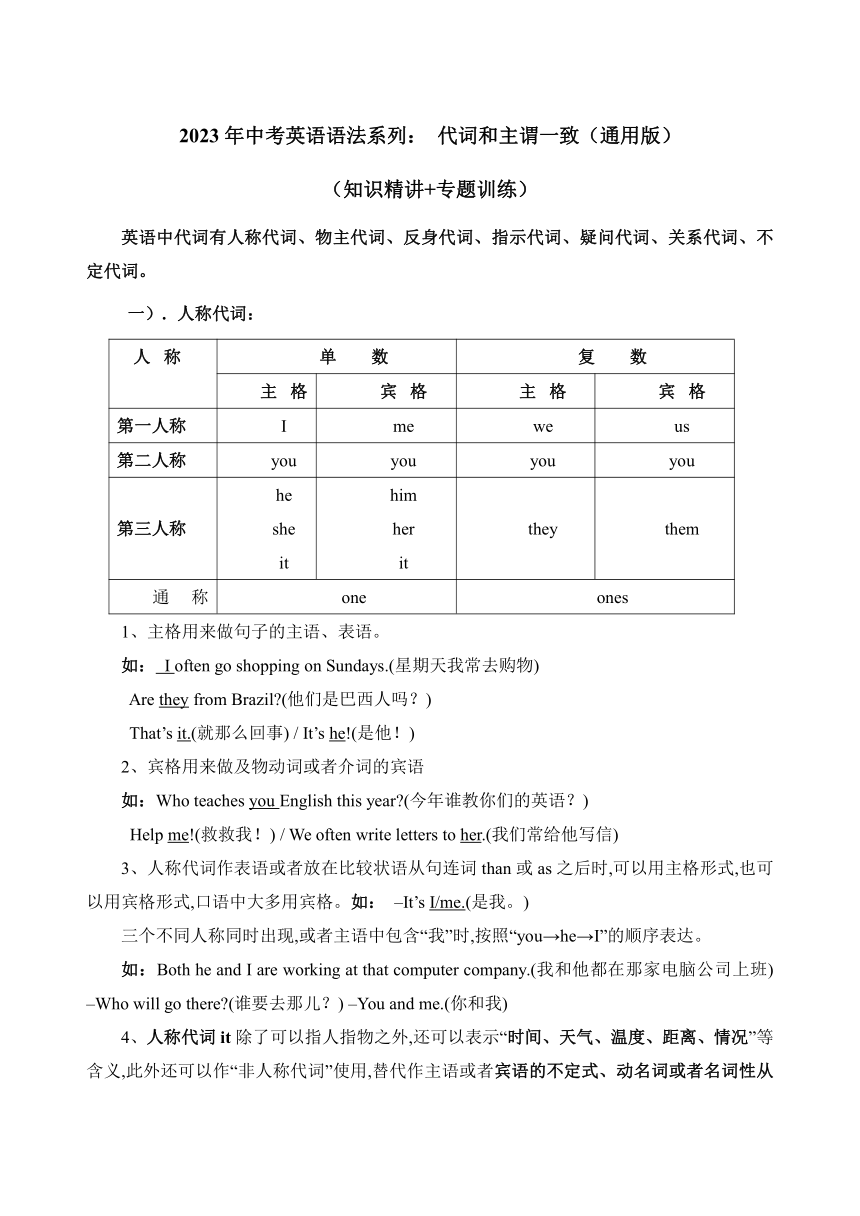 | |
| 格式 | zip | ||
| 文件大小 | 37.3KB | ||
| 资源类型 | 教案 | ||
| 版本资源 | 通用版 | ||
| 科目 | 英语 | ||
| 更新时间 | 2022-11-17 13:49:55 | ||
图片预览

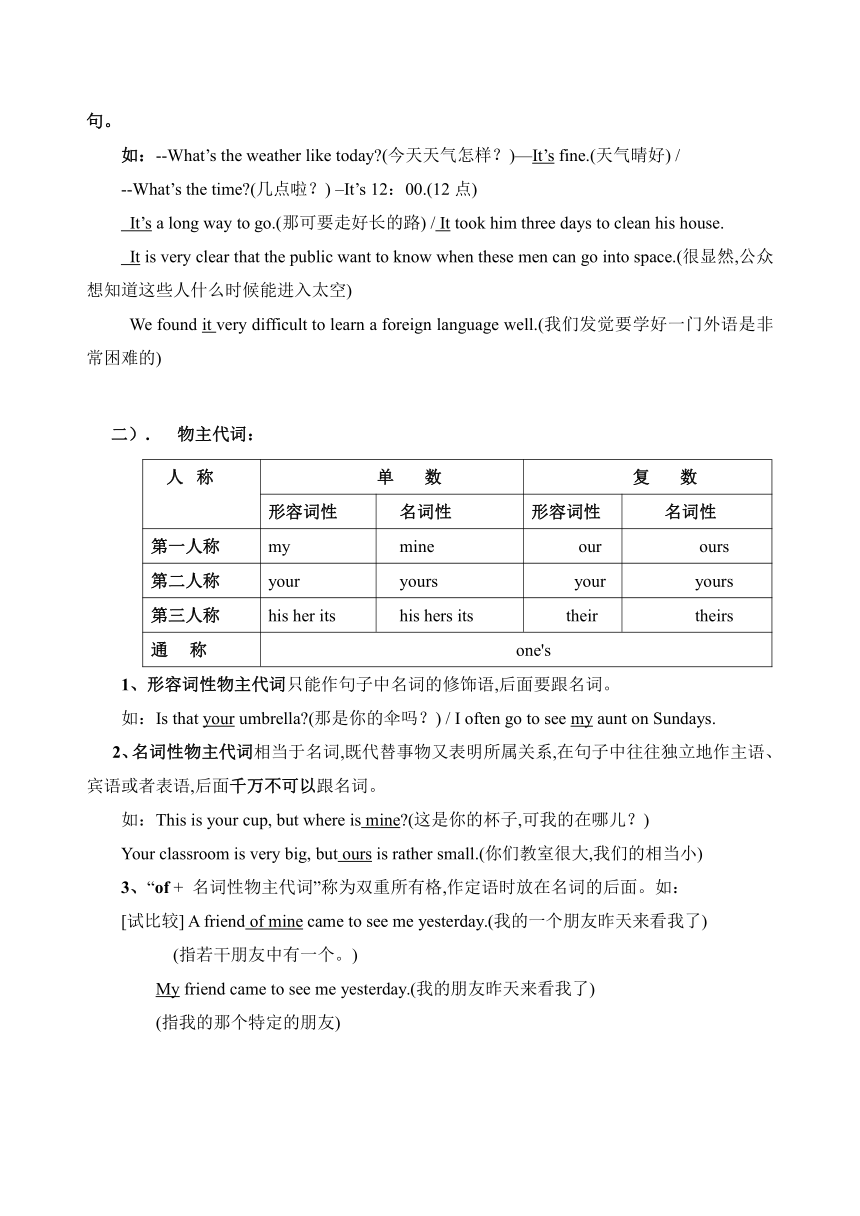
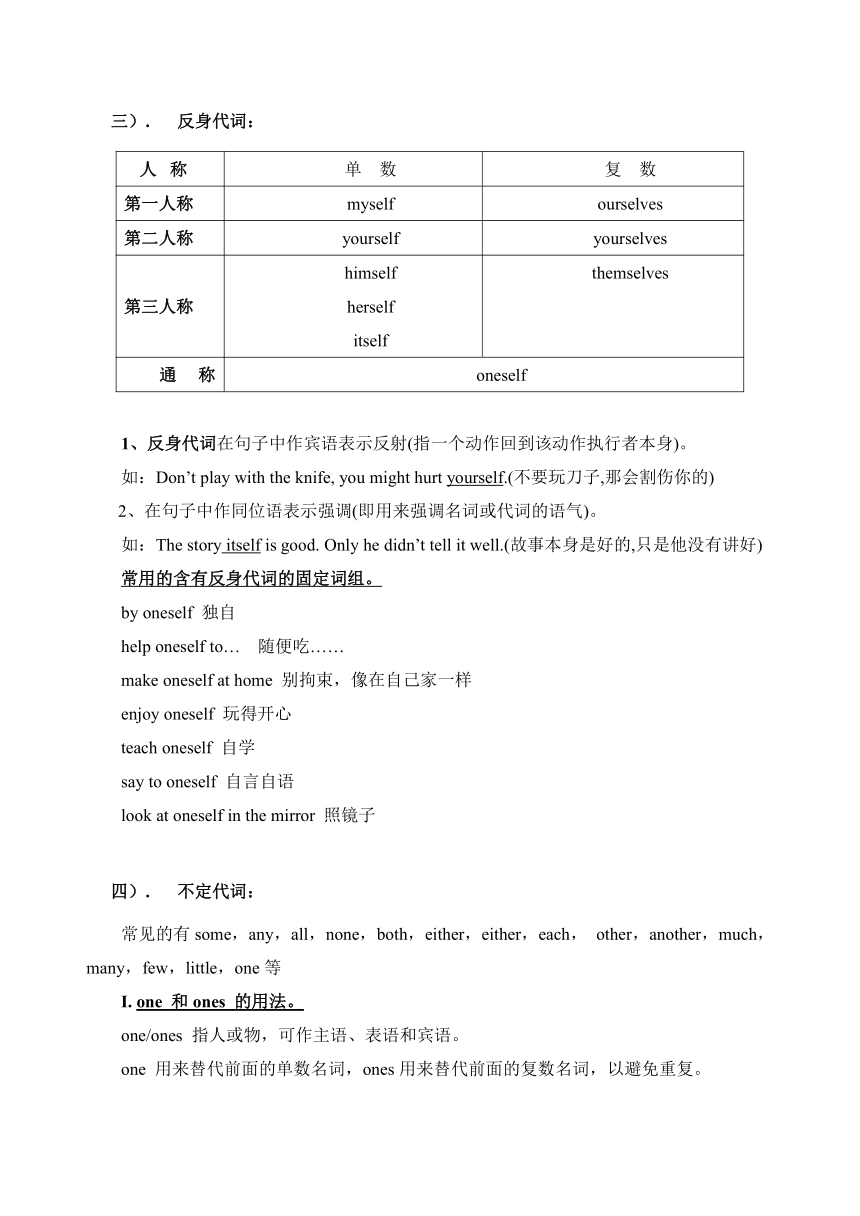
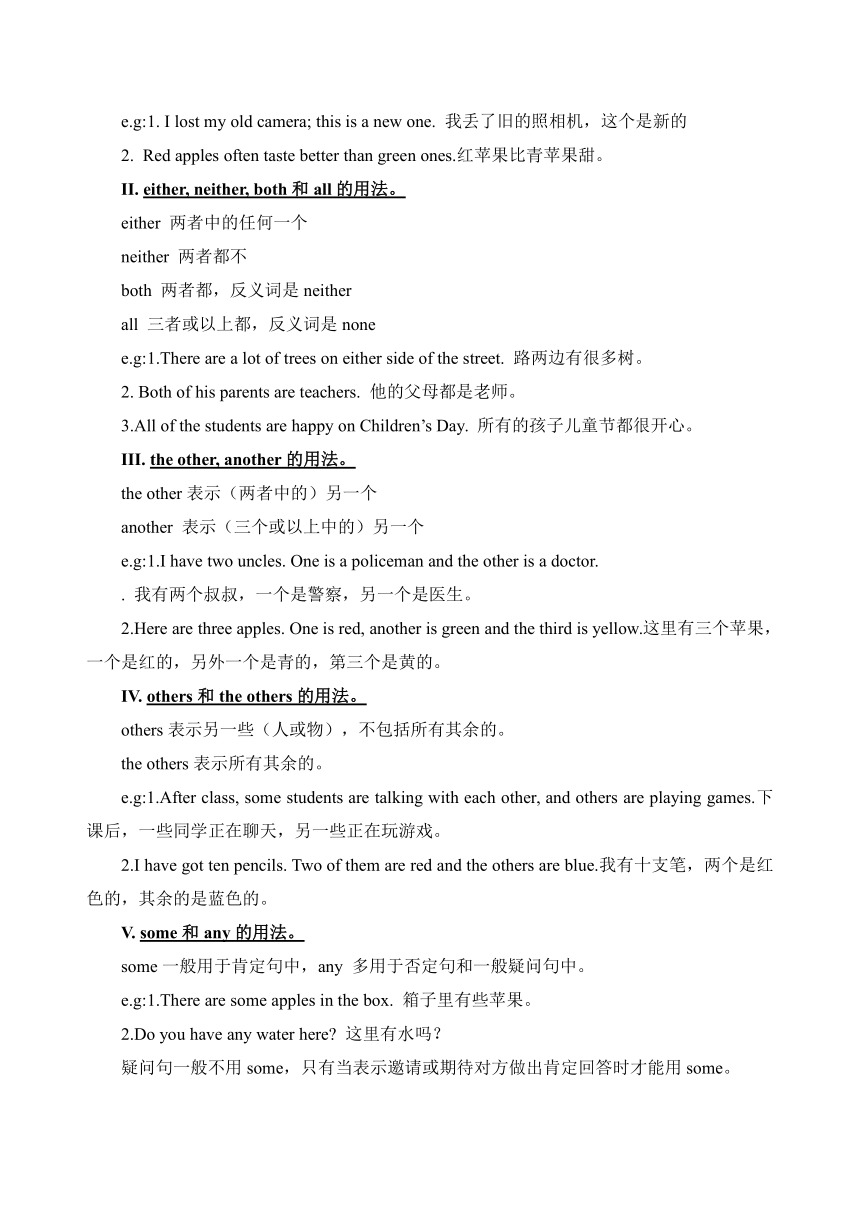
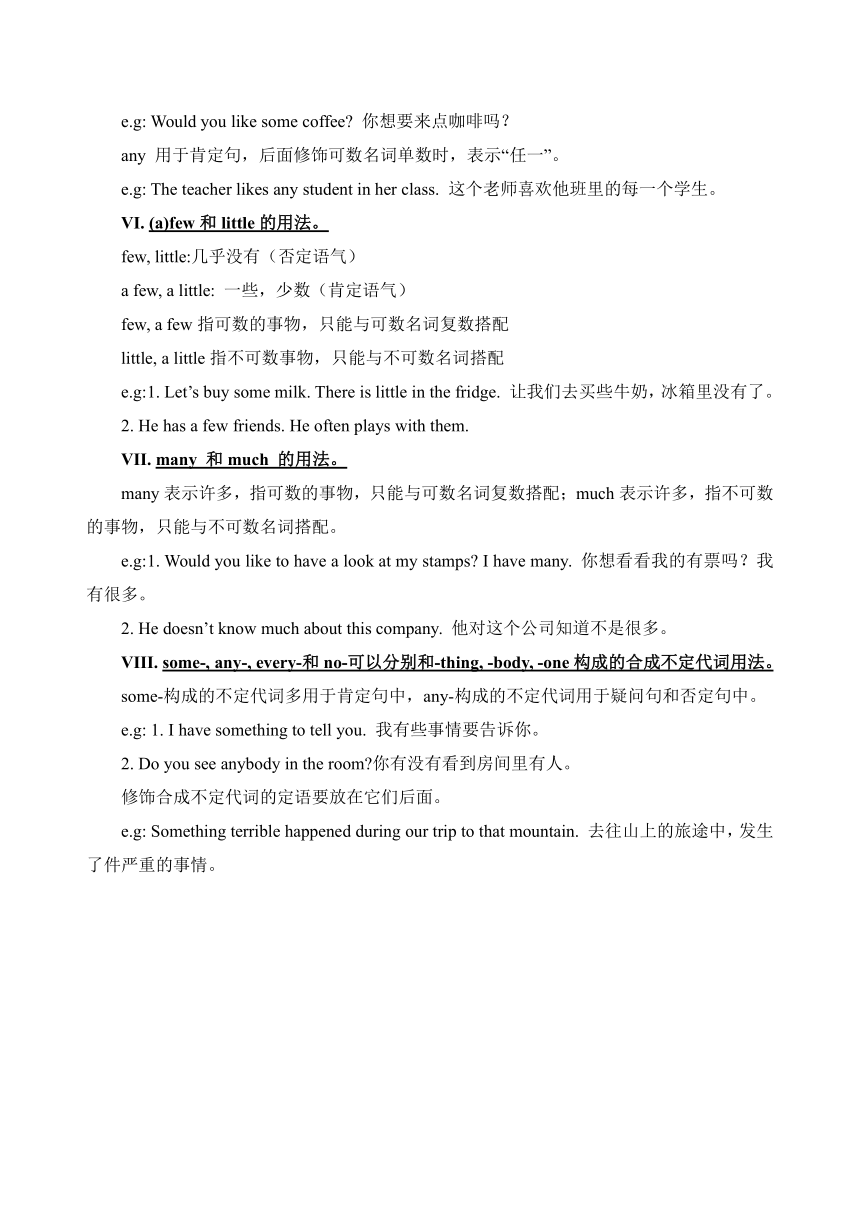
文档简介
2023年中考英语语法系列: 代词和主谓一致(通用版)
(知识精讲+专题训练)
英语中代词有人称代词、物主代词、反身代词、指示代词、疑问代词、关系代词、不定代词。
人称代词:
人 称 单 数 复 数
主 格 宾 格 主 格 宾 格
第一人称 I me we us
第二人称 you you you you
第三人称 he she it him her it they them
通 称 one ones
1、主格用来做句子的主语、表语。
如: I often go shopping on Sundays.(星期天我常去购物)
Are they from Brazil (他们是巴西人吗?)
That’s it.(就那么回事) / It’s he!(是他!)
2、宾格用来做及物动词或者介词的宾语
如:Who teaches you English this year (今年谁教你们的英语?)
Help me!(救救我!) / We often write letters to her.(我们常给他写信)
3、人称代词作表语或者放在比较状语从句连词than或as之后时,可以用主格形式,也可以用宾格形式,口语中大多用宾格。如: –It’s I/me.(是我。)
三个不同人称同时出现,或者主语中包含“我”时,按照“you→he→I”的顺序表达。
如:Both he and I are working at that computer company.(我和他都在那家电脑公司上班) –Who will go there (谁要去那儿?) –You and me.(你和我)
4、人称代词it除了可以指人指物之外,还可以表示“时间、天气、温度、距离、情况”等含义,此外还可以作“非人称代词”使用,替代作主语或者宾语的不定式、动名词或者名词性从句。
如:--What’s the weather like today (今天天气怎样?)—It’s fine.(天气晴好) /
--What’s the time (几点啦?) –It’s 12:00.(12点)
It’s a long way to go.(那可要走好长的路) / It took him three days to clean his house.
It is very clear that the public want to know when these men can go into space.(很显然,公众想知道这些人什么时候能进入太空)
We found it very difficult to learn a foreign language well.(我们发觉要学好一门外语是非常困难的)
物主代词:
人 称 单 数 复 数
形容词性 名词性 形容词性 名词性
第一人称 my mine our ours
第二人称 your yours your yours
第三人称 his her its his hers its their theirs
通 称 one's
1、形容词性物主代词只能作句子中名词的修饰语,后面要跟名词。
如:Is that your umbrella (那是你的伞吗?) / I often go to see my aunt on Sundays.
2、名词性物主代词相当于名词,既代替事物又表明所属关系,在句子中往往独立地作主语、宾语或者表语,后面千万不可以跟名词。
如:This is your cup, but where is mine (这是你的杯子,可我的在哪儿?)
Your classroom is very big, but ours is rather small.(你们教室很大,我们的相当小)
3、“of + 名词性物主代词”称为双重所有格,作定语时放在名词的后面。如:
[试比较] A friend of mine came to see me yesterday.(我的一个朋友昨天来看我了)
(指若干朋友中有一个。)
My friend came to see me yesterday.(我的朋友昨天来看我了)
(指我的那个特定的朋友)
反身代词:
人 称 单 数 复 数
第一人称 myself ourselves
第二人称 yourself yourselves
第三人称 himself herself itself themselves
通 称 oneself
1、反身代词在句子中作宾语表示反射(指一个动作回到该动作执行者本身)。
如:Don’t play with the knife, you might hurt yourself.(不要玩刀子,那会割伤你的)
2、在句子中作同位语表示强调(即用来强调名词或代词的语气)。
如:The story itself is good. Only he didn’t tell it well.(故事本身是好的,只是他没有讲好)
常用的含有反身代词的固定词组。
by oneself 独自
help oneself to… 随便吃……
make oneself at home 别拘束,像在自己家一样
enjoy oneself 玩得开心
teach oneself 自学
say to oneself 自言自语
look at oneself in the mirror 照镜子
不定代词:
常见的有some,any,all,none,both,either,either,each, other,another,much,many,few,little,one等
I. one 和ones 的用法。
one/ones 指人或物,可作主语、表语和宾语。
one 用来替代前面的单数名词,ones用来替代前面的复数名词,以避免重复。
e.g: 1. I lost my old camera; this is a new one. 我丢了旧的照相机,这个是新的
Red apples often taste better than green ones.红苹果比青苹果甜。
II. either, neither, both和all的用法。
either 两者中的任何一个
neither 两者都不
both 两者都,反义词是neither
all 三者或以上都,反义词是none
e.g: 1.There are a lot of trees on either side of the street. 路两边有很多树。
2. Both of his parents are teachers. 他的父母都是老师。
3.All of the students are happy on Children’s Day. 所有的孩子儿童节都很开心。
III. the other, another的用法。
the other表示(两者中的)另一个
another 表示(三个或以上中的)另一个
e.g: 1.I have two uncles. One is a policeman and the other is a doctor.
. 我有两个叔叔,一个是警察,另一个是医生。
2.Here are three apples. One is red, another is green and the third is yellow.这里有三个苹果,一个是红的,另外一个是青的,第三个是黄的。
IV. others和the others的用法。
others表示另一些(人或物),不包括所有其余的。
the others表示所有其余的。
e.g:1.After class, some students are talking with each other, and others are playing games.下课后,一些同学正在聊天,另一些正在玩游戏。
2.I have got ten pencils. Two of them are red and the others are blue.我有十支笔,两个是红色的,其余的是蓝色的。
V. some和any的用法。
some一般用于肯定句中,any 多用于否定句和一般疑问句中。
e.g: 1.There are some apples in the box. 箱子里有些苹果。
2.Do you have any water here 这里有水吗?
疑问句一般不用some,只有当表示邀请或期待对方做出肯定回答时才能用some。
e.g: Would you like some coffee 你想要来点咖啡吗?
any 用于肯定句,后面修饰可数名词单数时,表示“任一”。
e.g: The teacher likes any student in her class. 这个老师喜欢他班里的每一个学生。
VI. (a)few和little的用法。
few, little:几乎没有(否定语气)
a few, a little: 一些,少数(肯定语气)
few, a few指可数的事物,只能与可数名词复数搭配
little, a little指不可数事物,只能与不可数名词搭配
e.g: 1. Let’s buy some milk. There is little in the fridge. 让我们去买些牛奶,冰箱里没有了。
2. He has a few friends. He often plays with them.
VII. many 和much 的用法。
many表示许多,指可数的事物,只能与可数名词复数搭配;much表示许多,指不可数的事物,只能与不可数名词搭配。
e.g: 1. Would you like to have a look at my stamps I have many. 你想看看我的有票吗?我有很多。
2. He doesn’t know much about this company. 他对这个公司知道不是很多。
VIII. some-, any-, every-和no-可以分别和-thing, -body, -one构成的合成不定代词用法。
some-构成的不定代词多用于肯定句中,any-构成的不定代词用于疑问句和否定句中。
e.g: 1. I have something to tell you. 我有些事情要告诉你。
2. Do you see anybody in the room 你有没有看到房间里有人。
修饰合成不定代词的定语要放在它们后面。
e.g: Something terrible happened during our trip to that mountain. 去往山上的旅途中,发生了件严重的事情。
指示代词:
常见的有this,that,these,those
指示代词既可以单独使用做句子的主语、宾语或表语,也可以作定语修饰名词。
Who whom whose which what
谁(主格) 谁(宾格) 谁的 哪个,哪些 什么
如:What’s this (这是什么?)
That model plane is made of plastic.(那只模型飞机是塑料做的)(被动句)
Remember never to do such things.(记得永远不要做这样的事情)
Do the same as the teacher tells you. (按老师说的做)
---Who is it (是谁?) ---It’s me!(是我!)
六).相互代词
表示相互关系的词叫相互代词。
each other, one another 是相互代词,译成“互相”, 可以通用。each other 表示两者中的两两之间;one anther 表示三者或以上的两两之间。它们有所有格形式 each other's, one another's。
We must help each other when we are in trouble.
(我们身处困境时要互相帮助。)
They sat there without talking to one another / each other.
(他们坐在那儿,互相都不说话。)
七).关系代词
用来引导定语从句的代词叫关系代词
(1)关系代词who 、which、 that 、whom、whose、as 等,将定语从句和主句连接起来。英语中的关系代词一方面在从句中担任一定的成分,另一方面又起连接作用。
The student who is drawing a picture is in Grade One.
(正在画画的学生是一年级的。)
(2)关系代词who / whom指人,如果作从句的宾语,则有时省略。
Do you know the man who is wearing a red hat
(你认识那个戴着红帽子的男人吗?)
(3)关系代词which 指物,如果作从句的宾语,则有时省略。
Have you found the book which you lost several days ago
(你找到几天前丢失的那本书了吗?)
(4)关系代词that既可指人也可指物,如果作从句的宾语,则有时省略。
Can you see the man/dog that is running along the river bank
(你看得见顺着河跑的男人/狗了吗?)
代词作主语 主谓一致
【注意】名词或代词作主语时和谓语之间的单复数的一致问题:
主语和谓语基本保持单复数的一致,即:主语是可数名词单数或不可数名词时,谓语动词用单数形式:
如:The computer was a great invention.(计算机是个了不起的发明)
The water in the glass is very cold.(玻璃杯里的水很冷)
集体名词(如family, class, team, group, row, police, school等)做句子主语时,
如果表示整体概念,则谓语用单数形式,
如:Class Three is a very good class.(三班是好班)
如果表示其中的所有成员时,则谓语用复数形式,
如:Class Three have a map of China.(三班有张中国地图)
Chinese, Japanese, fish, sheep, people等表示单个时谓语用单数,表示许多时,谓语用复数。
如:There is a sheep in the yard.(院子里有只绵羊)
There are some sheep in the yard.(院子里有一些绵羊)
maths, news等虽然有s结尾,但不是复数,因此谓语仍用单数:The news is very exciting. (这个消息令人兴奋)
glasses, shoes, socks, trousers, gloves等名词往往用复数形式,谓语用复数。The trousers are very cheap and I want to take them.(裤子很便宜,我想买)
a lot of 后跟名词复数时谓语用复数形式,跟不可数名词时谓语用单数形式。如:A lot of students are playing baseball now.(现在有许多学生在打垒球) A lot of time was wasted on that work.(大量的时间花在了那个工作上)(被动句)
and 连接两个名词做主语时,谓语原则上用复数,但是两个名词若构成一个整体事物时,谓语则用单数。
如:The teacher and his son are picking apples now.(老师和他的儿子在摘苹果) Fish and chips is very famous food. (鱼和薯条是一种出名的食品)
there be 句型中be的单复数一般由靠近的名词决定。
如:There is a table and four chairs in the room.(房间里有一张桌子和四张椅子)
用both…and…连接两个事物做主语时,谓语一般用复数。
如:Both you and I are required to be here tomorrow.(你和我明天要求都来)
主语中含有with的短语时,谓语单复数由with之前的人物决定。
如:A woman with a 7-year-old child was standing at the side of the road. (一名妇女带着一个七岁的孩子(当时)就站在路边)
either…or…或者 neither…nor…连接两个人物做句子主语时,谓语采用就近原则。
如:Either you or he is right.(要么是你对,要么是他对/你和他有一个人是对的)
Neither you nor I am going there.(你和我都不打算去那里)
表示一段时间或长度概念的复数名词做主语时,谓语一般用单数。
如:Two months is not a short time.(两个月不是个短时间)
Two thousand kilometers is quite a long distance(距离).(两千千米是相当长的一段距离)
代词专项训练
一、单项选择题
( ) 1. The weather in Guangzhou is hotter than ____ in Shenyang.
A. that B. it C. this D. one
( ) 2. Mr. Green is our English teacher. _____comes from the USA.
A. He B. She C. It D. They
( ) 3. My bike is broken. May I borrow________
A. you B. yourself C. yours D. your
( ) 4. Would you like some tea Yes, just_________.
A. a few B. few C. a little D. little bit
( ) 5. Would you like some tea or coffee _________. Thanks, I’ve had enough.
A. Either B. Neither C. Some D. Both
( ) 6. I bought _______ exercise books with __________ money.
A. a few, a few B. a few, a little
C. a little, a few D. a little, a little
( ) 7. I made the cake by ____________. Help __________, Tom.
A. ourselves, yourself B. myself, yourself
C. myself, you D. me, him
( ) 8. Enjoy_____________, Mark and Mary.
A. yourself B. myself
C. yourselves D. themselves
( ) 9. _____________ house is this It’s mine.
A. What B. Who C. Whose D. Whose
( ) 10. She is a student and ____________ name is Mary.
A. she B. her C. hers D. his
( ) 11. She will go skating and I will do _________.
A. such B. same C. the same as D. the same
( ) 12. __________ is he He is a bus driver.
A. Who B. Which C. That D. What
( ) 13. _____ hat is this It’s __________.
A. Whose, me B. Who, mine
C. Whom, his D. Whose, mine
( ) 14. The population of China is larger than __________ of Japan.
A. one B. it C. that D. those
( ) 15. Lily is more clever than _______ in his class.
A. anybody B. anyone else
C. else anyone D. somebody else
( ) 16. _________ like music.
A. Both of them B. Both of they
C. The both girls D. Both them
( ) 17. Could you give me some ink Sorry, I have__________ in my bottle.
A. a few B. few C. a little D. little
( ) 18. He has ___________ to tell us.
A. something important B. important something
C. anything useful D. useful nothing
( ) 19. Would you like _____ coffee Yes, I’d like ____.
A. any, any B. some, some C. some, any D. any, some
( ) 20. _________ of the teachers are excellent in our school.
A. Every B. Each C. Either D. All
( ) 21. Of the three foreigners, one is from London and ________ are from the USA.
A. two others B. the other two
C. another two D. the both
( ) 22. Which would you like, tea or coffee _______ is OK.
A. Either B. Neither C. Any D. Both
( ) 23. Help __________ to some chicken, boys and girls.
A. you B. yours C. yourself D. yourselves
( ) 24. ---What do you usually have for breakfast
---_____ milk and ______ eggs.
A. Little, a little B. A few, few
C. A little, a few D. A few, a little
( ) 25. Who taught ___ history last year Nobody! He learned it __.
A. him, himself B. his, himself
C. himself, himself D. his, him
( ) 26. There isn’t ___ paper here. Will you go and get ____for me
A. any, any B. any, some
C. much, many D. many, much
( ) 27. The farmer is busy because he has so _______ sheep to keep and so _______ work to do.
A. much, many B. many, much
C. many, a lot D. a lot, much
( ) 28. On _______ sides of the river,there’re many tall trees.
A. every B. all C. both D. each
( ) 29. Whose photo is this It’s __________.
A. me B. mine C. my D. myself
( ) 30. Who is playing the piano in the next room _______ is Li Ping’s brother.
This B. That C. It D. He
( ) 31.Luckily, ________ of the workers were wounded in the accident.
A.neither B.both C.all D.none
( ) 32.I would like to invite ________ to the opening of ________ new library.
A.yourself; ourselves B.your; we C.you; our D.you; us
( ) 33.Robert went to ________ city yesterday and he’ll be back in a week.
A.other B.the other C.another D.any other
( ) 34.You are who you are. There will never be ________ person who is exactly like you.
A.the other B.others C.the others D.another
( ) 35.I invite Tom and his sister to go on a picnic with me, but ________ of them wants to go because they have too much work to do.
all B.either C.neither D.None
( ) 36.The app “MAYI” encourages people to give away the clothes ________ they don’t need to the poor.
A.what B.whom C.who D.that
( )37.We’ll never forget the heroes ________ bring people hope in difficult times.
A.which B.whom C.whose D.who
( )38.Great changes have taken place here. Everything ________ comes into my eyes is so new to me.
A.that B.which C.who D.whom
( )39.In my opinion, of all the books, this is the only one ______ is well worth reading.
A.who B.that C.whom D.what
( )40.The photo________ taken by my classmate last week is very nice.
A.which were B.that is C.that were D.which was
二.根据句意,选择合适的词填空。
1. Li Ming is more careful than ___other boy in the class. (some/any)
2. I don’t have _____ money, but I have____ friends. (many/much)
3. Don’t worry. There is ________ time left. (a little/little)
4. He did well in the exam. So he made ___ mistakes. (a few/few)
5. Li Ming and Li Ping are _________ from China. (both/all)
6. There are many buildings on ___sides of the street. (both/either)
7. I hope ________ goes well. (something/everything)
8. I don’t like this shirt, please show me ____. (the other/another)
9. I bought a lot of bananas. Only three of them are green, _______ are yellow.
(the others/others)
10.__ except Jack went to the park. He was ill. (Everybody/Nobody)
11.The journey was a little boring. We didn't enjoy ________(we) at all.
12.In fact, if you are not confident enough to speak English, you can talk to _____(you) first.
13.The artist _________(she) will come to our school next week.
14.Tom and Jerry have a lot in common. ________ (they) favorite basketball player is James Harden.
15.When our washing machine broke, our neighbors let us use ________(they).
16.E-mail, as well as telephones, ____(am/is /are)an important part in daily communication.
17.Not only the teacher, but also the students _____(am/is /are)looking forward to seeing the film.
18.There _____(am/is /are) some chairs and a table on the desk.
19.All of the money ____ (am/is /are)mine.
20.Every boy and every girl _____ (am/is /are)happy.
参考答案:
一.
1-5 AACCB 6-10 BBCCB 11-15 DDDCB 16-20 ADABD
21-25 BADCA 26-30 BBCBC 31-35 DCCDC 36-40 DDABD
二.
any 2.much,many 3.a little 4.few 5. both
both 7.everything 8. another 9.the others 10.Everyone
ourselves 12.yourself 13.herself 14.Their 15.theirs
16.is 17.are 18.are 19.is 20.is
(知识精讲+专题训练)
英语中代词有人称代词、物主代词、反身代词、指示代词、疑问代词、关系代词、不定代词。
人称代词:
人 称 单 数 复 数
主 格 宾 格 主 格 宾 格
第一人称 I me we us
第二人称 you you you you
第三人称 he she it him her it they them
通 称 one ones
1、主格用来做句子的主语、表语。
如: I often go shopping on Sundays.(星期天我常去购物)
Are they from Brazil (他们是巴西人吗?)
That’s it.(就那么回事) / It’s he!(是他!)
2、宾格用来做及物动词或者介词的宾语
如:Who teaches you English this year (今年谁教你们的英语?)
Help me!(救救我!) / We often write letters to her.(我们常给他写信)
3、人称代词作表语或者放在比较状语从句连词than或as之后时,可以用主格形式,也可以用宾格形式,口语中大多用宾格。如: –It’s I/me.(是我。)
三个不同人称同时出现,或者主语中包含“我”时,按照“you→he→I”的顺序表达。
如:Both he and I are working at that computer company.(我和他都在那家电脑公司上班) –Who will go there (谁要去那儿?) –You and me.(你和我)
4、人称代词it除了可以指人指物之外,还可以表示“时间、天气、温度、距离、情况”等含义,此外还可以作“非人称代词”使用,替代作主语或者宾语的不定式、动名词或者名词性从句。
如:--What’s the weather like today (今天天气怎样?)—It’s fine.(天气晴好) /
--What’s the time (几点啦?) –It’s 12:00.(12点)
It’s a long way to go.(那可要走好长的路) / It took him three days to clean his house.
It is very clear that the public want to know when these men can go into space.(很显然,公众想知道这些人什么时候能进入太空)
We found it very difficult to learn a foreign language well.(我们发觉要学好一门外语是非常困难的)
物主代词:
人 称 单 数 复 数
形容词性 名词性 形容词性 名词性
第一人称 my mine our ours
第二人称 your yours your yours
第三人称 his her its his hers its their theirs
通 称 one's
1、形容词性物主代词只能作句子中名词的修饰语,后面要跟名词。
如:Is that your umbrella (那是你的伞吗?) / I often go to see my aunt on Sundays.
2、名词性物主代词相当于名词,既代替事物又表明所属关系,在句子中往往独立地作主语、宾语或者表语,后面千万不可以跟名词。
如:This is your cup, but where is mine (这是你的杯子,可我的在哪儿?)
Your classroom is very big, but ours is rather small.(你们教室很大,我们的相当小)
3、“of + 名词性物主代词”称为双重所有格,作定语时放在名词的后面。如:
[试比较] A friend of mine came to see me yesterday.(我的一个朋友昨天来看我了)
(指若干朋友中有一个。)
My friend came to see me yesterday.(我的朋友昨天来看我了)
(指我的那个特定的朋友)
反身代词:
人 称 单 数 复 数
第一人称 myself ourselves
第二人称 yourself yourselves
第三人称 himself herself itself themselves
通 称 oneself
1、反身代词在句子中作宾语表示反射(指一个动作回到该动作执行者本身)。
如:Don’t play with the knife, you might hurt yourself.(不要玩刀子,那会割伤你的)
2、在句子中作同位语表示强调(即用来强调名词或代词的语气)。
如:The story itself is good. Only he didn’t tell it well.(故事本身是好的,只是他没有讲好)
常用的含有反身代词的固定词组。
by oneself 独自
help oneself to… 随便吃……
make oneself at home 别拘束,像在自己家一样
enjoy oneself 玩得开心
teach oneself 自学
say to oneself 自言自语
look at oneself in the mirror 照镜子
不定代词:
常见的有some,any,all,none,both,either,either,each, other,another,much,many,few,little,one等
I. one 和ones 的用法。
one/ones 指人或物,可作主语、表语和宾语。
one 用来替代前面的单数名词,ones用来替代前面的复数名词,以避免重复。
e.g: 1. I lost my old camera; this is a new one. 我丢了旧的照相机,这个是新的
Red apples often taste better than green ones.红苹果比青苹果甜。
II. either, neither, both和all的用法。
either 两者中的任何一个
neither 两者都不
both 两者都,反义词是neither
all 三者或以上都,反义词是none
e.g: 1.There are a lot of trees on either side of the street. 路两边有很多树。
2. Both of his parents are teachers. 他的父母都是老师。
3.All of the students are happy on Children’s Day. 所有的孩子儿童节都很开心。
III. the other, another的用法。
the other表示(两者中的)另一个
another 表示(三个或以上中的)另一个
e.g: 1.I have two uncles. One is a policeman and the other is a doctor.
. 我有两个叔叔,一个是警察,另一个是医生。
2.Here are three apples. One is red, another is green and the third is yellow.这里有三个苹果,一个是红的,另外一个是青的,第三个是黄的。
IV. others和the others的用法。
others表示另一些(人或物),不包括所有其余的。
the others表示所有其余的。
e.g:1.After class, some students are talking with each other, and others are playing games.下课后,一些同学正在聊天,另一些正在玩游戏。
2.I have got ten pencils. Two of them are red and the others are blue.我有十支笔,两个是红色的,其余的是蓝色的。
V. some和any的用法。
some一般用于肯定句中,any 多用于否定句和一般疑问句中。
e.g: 1.There are some apples in the box. 箱子里有些苹果。
2.Do you have any water here 这里有水吗?
疑问句一般不用some,只有当表示邀请或期待对方做出肯定回答时才能用some。
e.g: Would you like some coffee 你想要来点咖啡吗?
any 用于肯定句,后面修饰可数名词单数时,表示“任一”。
e.g: The teacher likes any student in her class. 这个老师喜欢他班里的每一个学生。
VI. (a)few和little的用法。
few, little:几乎没有(否定语气)
a few, a little: 一些,少数(肯定语气)
few, a few指可数的事物,只能与可数名词复数搭配
little, a little指不可数事物,只能与不可数名词搭配
e.g: 1. Let’s buy some milk. There is little in the fridge. 让我们去买些牛奶,冰箱里没有了。
2. He has a few friends. He often plays with them.
VII. many 和much 的用法。
many表示许多,指可数的事物,只能与可数名词复数搭配;much表示许多,指不可数的事物,只能与不可数名词搭配。
e.g: 1. Would you like to have a look at my stamps I have many. 你想看看我的有票吗?我有很多。
2. He doesn’t know much about this company. 他对这个公司知道不是很多。
VIII. some-, any-, every-和no-可以分别和-thing, -body, -one构成的合成不定代词用法。
some-构成的不定代词多用于肯定句中,any-构成的不定代词用于疑问句和否定句中。
e.g: 1. I have something to tell you. 我有些事情要告诉你。
2. Do you see anybody in the room 你有没有看到房间里有人。
修饰合成不定代词的定语要放在它们后面。
e.g: Something terrible happened during our trip to that mountain. 去往山上的旅途中,发生了件严重的事情。
指示代词:
常见的有this,that,these,those
指示代词既可以单独使用做句子的主语、宾语或表语,也可以作定语修饰名词。
Who whom whose which what
谁(主格) 谁(宾格) 谁的 哪个,哪些 什么
如:What’s this (这是什么?)
That model plane is made of plastic.(那只模型飞机是塑料做的)(被动句)
Remember never to do such things.(记得永远不要做这样的事情)
Do the same as the teacher tells you. (按老师说的做)
---Who is it (是谁?) ---It’s me!(是我!)
六).相互代词
表示相互关系的词叫相互代词。
each other, one another 是相互代词,译成“互相”, 可以通用。each other 表示两者中的两两之间;one anther 表示三者或以上的两两之间。它们有所有格形式 each other's, one another's。
We must help each other when we are in trouble.
(我们身处困境时要互相帮助。)
They sat there without talking to one another / each other.
(他们坐在那儿,互相都不说话。)
七).关系代词
用来引导定语从句的代词叫关系代词
(1)关系代词who 、which、 that 、whom、whose、as 等,将定语从句和主句连接起来。英语中的关系代词一方面在从句中担任一定的成分,另一方面又起连接作用。
The student who is drawing a picture is in Grade One.
(正在画画的学生是一年级的。)
(2)关系代词who / whom指人,如果作从句的宾语,则有时省略。
Do you know the man who is wearing a red hat
(你认识那个戴着红帽子的男人吗?)
(3)关系代词which 指物,如果作从句的宾语,则有时省略。
Have you found the book which you lost several days ago
(你找到几天前丢失的那本书了吗?)
(4)关系代词that既可指人也可指物,如果作从句的宾语,则有时省略。
Can you see the man/dog that is running along the river bank
(你看得见顺着河跑的男人/狗了吗?)
代词作主语 主谓一致
【注意】名词或代词作主语时和谓语之间的单复数的一致问题:
主语和谓语基本保持单复数的一致,即:主语是可数名词单数或不可数名词时,谓语动词用单数形式:
如:The computer was a great invention.(计算机是个了不起的发明)
The water in the glass is very cold.(玻璃杯里的水很冷)
集体名词(如family, class, team, group, row, police, school等)做句子主语时,
如果表示整体概念,则谓语用单数形式,
如:Class Three is a very good class.(三班是好班)
如果表示其中的所有成员时,则谓语用复数形式,
如:Class Three have a map of China.(三班有张中国地图)
Chinese, Japanese, fish, sheep, people等表示单个时谓语用单数,表示许多时,谓语用复数。
如:There is a sheep in the yard.(院子里有只绵羊)
There are some sheep in the yard.(院子里有一些绵羊)
maths, news等虽然有s结尾,但不是复数,因此谓语仍用单数:The news is very exciting. (这个消息令人兴奋)
glasses, shoes, socks, trousers, gloves等名词往往用复数形式,谓语用复数。The trousers are very cheap and I want to take them.(裤子很便宜,我想买)
a lot of 后跟名词复数时谓语用复数形式,跟不可数名词时谓语用单数形式。如:A lot of students are playing baseball now.(现在有许多学生在打垒球) A lot of time was wasted on that work.(大量的时间花在了那个工作上)(被动句)
and 连接两个名词做主语时,谓语原则上用复数,但是两个名词若构成一个整体事物时,谓语则用单数。
如:The teacher and his son are picking apples now.(老师和他的儿子在摘苹果) Fish and chips is very famous food. (鱼和薯条是一种出名的食品)
there be 句型中be的单复数一般由靠近的名词决定。
如:There is a table and four chairs in the room.(房间里有一张桌子和四张椅子)
用both…and…连接两个事物做主语时,谓语一般用复数。
如:Both you and I are required to be here tomorrow.(你和我明天要求都来)
主语中含有with的短语时,谓语单复数由with之前的人物决定。
如:A woman with a 7-year-old child was standing at the side of the road. (一名妇女带着一个七岁的孩子(当时)就站在路边)
either…or…或者 neither…nor…连接两个人物做句子主语时,谓语采用就近原则。
如:Either you or he is right.(要么是你对,要么是他对/你和他有一个人是对的)
Neither you nor I am going there.(你和我都不打算去那里)
表示一段时间或长度概念的复数名词做主语时,谓语一般用单数。
如:Two months is not a short time.(两个月不是个短时间)
Two thousand kilometers is quite a long distance(距离).(两千千米是相当长的一段距离)
代词专项训练
一、单项选择题
( ) 1. The weather in Guangzhou is hotter than ____ in Shenyang.
A. that B. it C. this D. one
( ) 2. Mr. Green is our English teacher. _____comes from the USA.
A. He B. She C. It D. They
( ) 3. My bike is broken. May I borrow________
A. you B. yourself C. yours D. your
( ) 4. Would you like some tea Yes, just_________.
A. a few B. few C. a little D. little bit
( ) 5. Would you like some tea or coffee _________. Thanks, I’ve had enough.
A. Either B. Neither C. Some D. Both
( ) 6. I bought _______ exercise books with __________ money.
A. a few, a few B. a few, a little
C. a little, a few D. a little, a little
( ) 7. I made the cake by ____________. Help __________, Tom.
A. ourselves, yourself B. myself, yourself
C. myself, you D. me, him
( ) 8. Enjoy_____________, Mark and Mary.
A. yourself B. myself
C. yourselves D. themselves
( ) 9. _____________ house is this It’s mine.
A. What B. Who C. Whose D. Whose
( ) 10. She is a student and ____________ name is Mary.
A. she B. her C. hers D. his
( ) 11. She will go skating and I will do _________.
A. such B. same C. the same as D. the same
( ) 12. __________ is he He is a bus driver.
A. Who B. Which C. That D. What
( ) 13. _____ hat is this It’s __________.
A. Whose, me B. Who, mine
C. Whom, his D. Whose, mine
( ) 14. The population of China is larger than __________ of Japan.
A. one B. it C. that D. those
( ) 15. Lily is more clever than _______ in his class.
A. anybody B. anyone else
C. else anyone D. somebody else
( ) 16. _________ like music.
A. Both of them B. Both of they
C. The both girls D. Both them
( ) 17. Could you give me some ink Sorry, I have__________ in my bottle.
A. a few B. few C. a little D. little
( ) 18. He has ___________ to tell us.
A. something important B. important something
C. anything useful D. useful nothing
( ) 19. Would you like _____ coffee Yes, I’d like ____.
A. any, any B. some, some C. some, any D. any, some
( ) 20. _________ of the teachers are excellent in our school.
A. Every B. Each C. Either D. All
( ) 21. Of the three foreigners, one is from London and ________ are from the USA.
A. two others B. the other two
C. another two D. the both
( ) 22. Which would you like, tea or coffee _______ is OK.
A. Either B. Neither C. Any D. Both
( ) 23. Help __________ to some chicken, boys and girls.
A. you B. yours C. yourself D. yourselves
( ) 24. ---What do you usually have for breakfast
---_____ milk and ______ eggs.
A. Little, a little B. A few, few
C. A little, a few D. A few, a little
( ) 25. Who taught ___ history last year Nobody! He learned it __.
A. him, himself B. his, himself
C. himself, himself D. his, him
( ) 26. There isn’t ___ paper here. Will you go and get ____for me
A. any, any B. any, some
C. much, many D. many, much
( ) 27. The farmer is busy because he has so _______ sheep to keep and so _______ work to do.
A. much, many B. many, much
C. many, a lot D. a lot, much
( ) 28. On _______ sides of the river,there’re many tall trees.
A. every B. all C. both D. each
( ) 29. Whose photo is this It’s __________.
A. me B. mine C. my D. myself
( ) 30. Who is playing the piano in the next room _______ is Li Ping’s brother.
This B. That C. It D. He
( ) 31.Luckily, ________ of the workers were wounded in the accident.
A.neither B.both C.all D.none
( ) 32.I would like to invite ________ to the opening of ________ new library.
A.yourself; ourselves B.your; we C.you; our D.you; us
( ) 33.Robert went to ________ city yesterday and he’ll be back in a week.
A.other B.the other C.another D.any other
( ) 34.You are who you are. There will never be ________ person who is exactly like you.
A.the other B.others C.the others D.another
( ) 35.I invite Tom and his sister to go on a picnic with me, but ________ of them wants to go because they have too much work to do.
all B.either C.neither D.None
( ) 36.The app “MAYI” encourages people to give away the clothes ________ they don’t need to the poor.
A.what B.whom C.who D.that
( )37.We’ll never forget the heroes ________ bring people hope in difficult times.
A.which B.whom C.whose D.who
( )38.Great changes have taken place here. Everything ________ comes into my eyes is so new to me.
A.that B.which C.who D.whom
( )39.In my opinion, of all the books, this is the only one ______ is well worth reading.
A.who B.that C.whom D.what
( )40.The photo________ taken by my classmate last week is very nice.
A.which were B.that is C.that were D.which was
二.根据句意,选择合适的词填空。
1. Li Ming is more careful than ___other boy in the class. (some/any)
2. I don’t have _____ money, but I have____ friends. (many/much)
3. Don’t worry. There is ________ time left. (a little/little)
4. He did well in the exam. So he made ___ mistakes. (a few/few)
5. Li Ming and Li Ping are _________ from China. (both/all)
6. There are many buildings on ___sides of the street. (both/either)
7. I hope ________ goes well. (something/everything)
8. I don’t like this shirt, please show me ____. (the other/another)
9. I bought a lot of bananas. Only three of them are green, _______ are yellow.
(the others/others)
10.__ except Jack went to the park. He was ill. (Everybody/Nobody)
11.The journey was a little boring. We didn't enjoy ________(we) at all.
12.In fact, if you are not confident enough to speak English, you can talk to _____(you) first.
13.The artist _________(she) will come to our school next week.
14.Tom and Jerry have a lot in common. ________ (they) favorite basketball player is James Harden.
15.When our washing machine broke, our neighbors let us use ________(they).
16.E-mail, as well as telephones, ____(am/is /are)an important part in daily communication.
17.Not only the teacher, but also the students _____(am/is /are)looking forward to seeing the film.
18.There _____(am/is /are) some chairs and a table on the desk.
19.All of the money ____ (am/is /are)mine.
20.Every boy and every girl _____ (am/is /are)happy.
参考答案:
一.
1-5 AACCB 6-10 BBCCB 11-15 DDDCB 16-20 ADABD
21-25 BADCA 26-30 BBCBC 31-35 DCCDC 36-40 DDABD
二.
any 2.much,many 3.a little 4.few 5. both
both 7.everything 8. another 9.the others 10.Everyone
ourselves 12.yourself 13.herself 14.Their 15.theirs
16.is 17.are 18.are 19.is 20.is
同课章节目录
- 词法
- 名词
- 动词和动词短语
- 动词语态
- 动词时态
- 助动词和情态动词
- 非谓语动词
- 冠词
- 代词
- 数词和量词
- 形容词副词及其比较等级
- 介词和介词短语
- 连词和感叹词
- 构词法
- 相似、相近词比较
- 句法
- 陈述句
- 一般疑问句和否定疑问句
- 特殊疑问句及选择疑问句
- 反意疑问句
- 存在句(There be句型)
- 宾语从句
- 定语从句
- 状语从句
- 主谓一致问题
- 简单句
- 并列句
- 复合句
- 主谓一致
- 主、表语从句
- 名词性从句
- 直接引语和间接引语
- 虚拟语气
- 感叹句
- 强调句
- 倒装句
- 祈使句
- 句子的成分
- 句子的分类
- 题型专区
- 单项选择部分
- 易错题
- 完形填空
- 阅读理解
- 词汇练习
- 听说训练
- 句型转换
- 补全对话
- 短文改错
- 翻译
- 书面表达
- 任务型阅读
- 语法填空
- 其他资料
